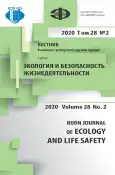Analysis of thiram derivatives use in plant complex of the Kursk region
- Authors: Korolev V.A.1, Medvedeva O.A.1, Ryadnova V.A.1, Losenok S.A.1, Nikitina E.S.1, Korolev I.V.1
-
Affiliations:
- Kursk State Medical University
- Issue: Vol 28, No 2 (2020)
- Pages: 103-111
- Section: Industrial Ecology
- URL: https://journal-vniispk.ru/2313-2310/article/view/323881
- DOI: https://doi.org/10.22363/2313-2310-2020-28-2-103-111
- ID: 323881
Cite item
Full Text
Abstract
The impact on the biosphere of anthropogenic factors is a serious environmental problem. Today, pesticides are becoming one of the important chemical factors that cause adverse environmental changes. Pesticides enter the human body through a contaminated hydrosphere, atmosphere, and food. Modern man is not able to grow and maintain crops without the use of pesticides. Penetrating into the human body, they cumulate, thereby contributing to the creation of threatening health situations. Despite this, modern human civilization cannot do without them. The purpose of the review was to study the circulation volume of derivatives of thiram, such as vitalon, vitavaks, vitasil, vitaros, tir and TMTD (Tetramethylthiuram Disulfide) in the agricultural complex of the Kursk region for the period 2007-2016. The data obtained at the Kursk Regional Plant Protection Station, as well as agrochemical protection station “Kurskaya”, were subjected to statistical analysis using the application “Statistica 6.0”. Circulating volumes of thiram's derivatives were examined in agro-industrial complex of Kursk area over a 10-year period. The proportion of fungicides of thiram's series with the release of agrochemicals dominant in the structure of seed crops cultivation technologies was investigated. A study of the structure of sown areas with the allocation of priority crops grown in the region was conducted, the total number of which amounted 80.76%. The ranking of the region by thiram’s derivatives was made. All studied fungicidal products of thiram are widely used for the cultivation of crops in the Kursk region. Identified regions with the biggest amount of making this group of agrochemicals in the soil are treated as high anthropogenic load zone and require the development of environmental protection. The volume of circulation of the studying group of pesticides can be dangerous to humans and animals, influence the formation of peoples’ somatic pathologies.
Keywords
About the authors
Vladimir A. Korolev
Kursk State Medical University
Author for correspondence.
Email: medecol1@yandex.ru
Doctor of Biological Sciences, Professor, Head of the Department of Biology, Medical Genetics and Ecology
3 Karla Marksa St, Kursk, 305041, Russian FederationOlga A. Medvedeva
Kursk State Medical University
Email: olgafrida@rambler.ru
Doctor of Biological Sciences, Professor of the Department of Microbiology, Virology and Immunology
3 Karla Marksa St, Kursk, 305041, Russian FederationVera A. Ryadnova
Kursk State Medical University
Email: veraan8@ya.ru
correspondence graduate student of the Department of Biology, Medical Genetics and Ecology
3 Karla Marksa St, Kursk, 305041, Russian FederationSergey A. Losenok
Kursk State Medical University
Email: losenok67@mail.ru
Doctor of Medical Sciences, Associate Professor of the Department of General Hygiene
3 Karla Marksa St, Kursk, 305041, Russian FederationEkaterina S. Nikitina
Kursk State Medical University
Email: kater.nikitina2012@yandex.ru
corresponding graduate student of the Department of Microbiology, Virology and Immunology
3 Karla Marksa St, Kursk, 305041, Russian FederationIvan V. Korolev
Kursk State Medical University
Email: medecol1@yandex.ru
4th year student at the Faculty of Pediatrics
3 Karla Marksa St, Kursk, 305041, Russian FederationReferences
- Serova YV, Matrosova LЕ. Biodegradation ability of microorganisms concerning tetramethylthiuramdisulfide. Aktual’nye voprosy veterinarnoj biologii [Current issues of veterinary biology]. 2013;3(19):37–38.
- Ilnitskaya AV, Bereznyak IV, Lipkina LI, Fedorova SG. Work safety in the application of pesticides in agriculture. Bezopasnost' zhiznedeyatel'nosti [Life safety]. 2006;(1):17–23.
- Akiyama Y, Matsuoka T, Yoshioca N. Pesticide residues in domestic agricultural products monitored in Hyogo Prefecture, Japan, FY 1995–2009. J. Pesticid. Science. 2011; 36(1):66–72.
- Sinitskaya TA, Malinovskaya NN. Toxicological-hygienic justification of the acceptable daily intake of acetamipride. Hygiene & Sanitation (Russian Journal). 2016;95(11): 1055–1058.
- Bryzgunova SS, Eremina MV. Assessment of the toxicological effects of pesticides on the human body. Uspekhi sovremennogo estestvoznaniya [Advances in modern natural science]. 2011;(8):95–96.
- Korolev VA, Ivanov VP, Shormanov VK, Kim AV, Yushin VV, Kirischeva NЕ, Nikitina ES. The relative ecological risk of forming the pediatric pathology in intensive use of fungicides TMTD. Kurskij nauchno-prakticheskij vestnik “Chelovek i ego zdorov'e” [Kursk Scientific and Practical Bulletin “Man and his health”]. 2012;(1):25–28.
- Aleshnya VV, Zhuravlev PV, Panasovets OP. A study in the experimental conditions of pesticide action on microorganisms characterizing sanitary-epidemiological safety of reservoirs. Hygiene & Sanitation (Russian Journal). 2016;95(8):785–789.
- Govorov DN, Jivich AV, Shabelnikov AA. Application of pesticides. Year 2014. Zashchita i karantin rastenij [Plant protection and quarantine]. 2014;(5):7–8.
- Artemova ОV. Risk of the exposure of pesticides to workers and environment during the aerial treatments. Hygiene & Sanitation (Russian Journal). 2016;95(4):375–380.
- Kvashnin YA. State ecological expertise and evaluation of pesticides and agrochemicals effects on the environment. Zashchita i karantin rastenij [Plant protection and quarantine]. 2011;(4):64–65.
- Khamitova RYa, Mirsaitova GT. Current trends in the use of pesticides. Hygiene & Sanitation (Russian Journal). 2014;(4):23–26.
- Popovich VV. About some new regulatory legal acts in the field of food safety of plant origin and safe handling with pesticides and agrochemicals. Zashchita i karantin rastenij [Plant protection and quarantine]. 2010;(11):15–16.
- Garcia-Reyes J, Jackson A, Molina-Diaz A, Cooks G. Desorption electrospray ionization mass spectrometry for trace analysis of agrochemicals in food. Anal. Chem. 2009; 81:820–829.
- Rakitsky VN, Bereznyak IV, Ilnitskaya AV. Model of the assessment of the risk of conditions of the work with the use of pesticides: results and development. Hygiene & Sanitation (Russian Journal). 2016;95(11):1041–1044.
- Ministry of Agriculture of Russia. Spisok pestitsidov i agrokhimikatov, razreshennykh k primeneniyu na territorii Rossiiskoi Federatsii [State catalog of pesticides and agrochemicals, approved for application within the territory of Russian Federation]. Moscow; 2017.
- Amelin VG, Bolshakov DS, Lavrukhin DK, Tretyakov AV. Simultaneous determination of tyram fungicides and tebuconazole in grain by high performance liquid of micellar electrokinetic chromatography. Izvestiya of Saratov University. New Series. Series: Chemistry. Biology. Ecology. 2013;13(1):7–11.
Supplementary files









